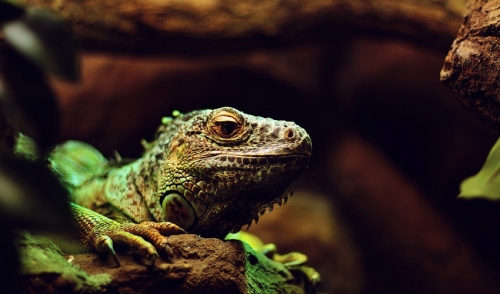
Water is critical for the health of all pets, especially reptiles that are often confined to heated enclosures. Water is essential for proper digestive health, temperature regulation, shedding skin, body circulation and more, and dehydration can quickly lead to acidosis, shock, kidney failure, heart failure or even death. Recognizing dehydration and knowing how to safely rehydrate your reptile can help you keep your pet's fluid balance at good levels for a healthy, water-rich life.
Signs of Dehydration
Reptiles do not typically pant when they become hot or dehydrated, but they can show a range of symptoms that indicate a lack of water. Typical dehydration symptoms include…
- Dry, wrinkled or puckered skin
- Loss of skin elasticity and flexibility
- Sunken, receded eyes
- Weakness and lethargy
- Sticky or dry membranes
- Flaky skin or trouble shedding
- Constipation or infrequent defecation
When these signs are noticed, it is important to take immediate action to rehydrate your reptile. Mild dehydration can be easily reversed and when water is made available, your reptile will perk up quickly as it gets fluid back into its system. If the dehydration is severe, however, it may be necessary to seek out veterinary guidance for emergency rehydration without stressing your pet.
Rehydrating Your Reptile
There are several ways to get fluid back into your pet reptile. In mild cases of dehydration, these steps may be more than adequate to help your pet recover. It is important to go slow, however, to be sure you do not shock your pet or severely unbalance its fluid levels before its body chemistry can adjust.
- Offer water or diluted electrolyte solutions such as sports drinks, Pedialyte or Ricelyte near the reptile's head for easy, convenient drinking.
- Use an eyedropper or needle-less syringe to drip water onto the reptile's snout. As the reptile licks the moisture off, continue offering drinks in this way.
If neither of these methods is effective at getting your pet to drink, it may be necessary for a veterinarian to offer fluids through feeding tubes or subcutaneous injections. Your vet can also better assess the reptile's overall hydration levels and check for any additional health problems caused by prolonged dehydration.
Avoiding Dehydration
One of the best ways to avoid subjecting your reptile to dehydration is to be sure they stay adequately hydrated at all times. Tips to keep your pet drinking well include…
- Wash water dishes daily and keep the water fresh and clean. Avoid using strong soaps or other cleansers that can cause an unwanted smell or contaminate the water.
- Offer wet food to your reptile so they ingest more moisture. Soaking prey in water before giving it to your reptile can be helpful to increase their water intake.
- Adjust the heat and humidity levels in your reptile's enclosure so it has the proper moisture in its environment to avoid drying out excessively.
- Offer your pet daily mistings or lukewarm water for occasional soaking. Many reptiles will enjoy this type of interaction and bathing, and it will help with their moisture intake.
Reptiles can be fascinating pets, and ensuring they have proper water and do not become dehydrated is part of the best care you can provide for any snake, lizard, turtle or other reptile in your care.







Comments